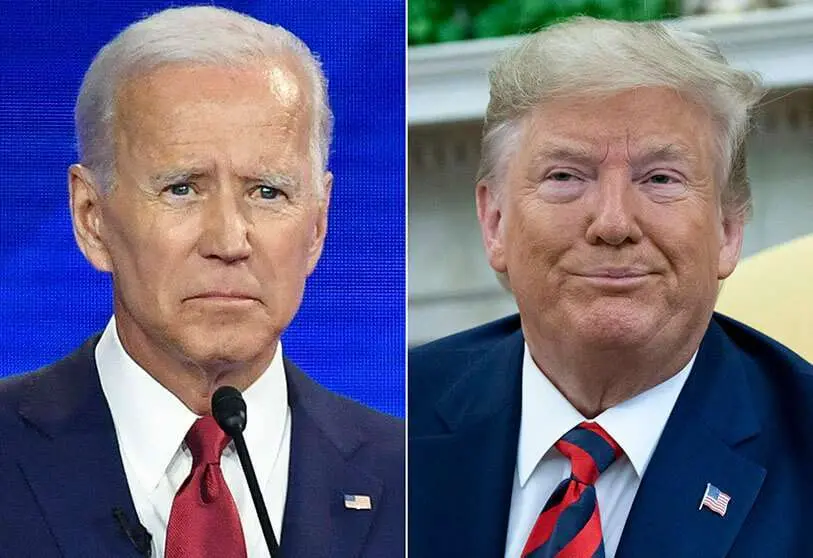Biden has victory in his hand, Trump is not resigned

With four days to go before D-Day (Election Day for Americans), nothing is certain about the US presidential elections on 3 November. It would not be a surprise if neither of the candidates won, given the vaccine of realism the polls showed four years ago in the race lost by Hillary Clinton, but Joe Biden is close to becoming the 46th president of the most powerful country in the world.
Almost 80 million voters have already voted, half of those who voted in 2016. There is a huge early mobilisation of the vote, which has set off all the alarms in Trump's candidacy, though many factors may influence this, including fear of going to the polling station on the day when there will be most crowds, and thus avoid the risk of the coronavirus. But this will surely cause a delay in the counting of the results, with the tremendous effect that election night will not end with the announcement of the winner and the suspense will last for days. Prominent figures such as Mark Zuckerberg have already expressed their fears of even an outbreak of violence in the streets during this time of uncertainty, and chain shops such as Wallmart have removed weapons and ammunition from their shelves. Exaggeration, or dangerous reality? The breeding ground for radical outbreaks is uncertainty, and if it lasts too long it would not be surprising if the streets were hit by protests.
This situation would be even more complicated if the dreaded tie were to break out between 269 supporters. Allegations of possible fraud will fly over the heads of the Americans, and the cleanliness of the process would be called into question. Thomas Jefferson and John Quincy Adams know what this is all about. But before we get to that point of schizophrenia, it's time to look at the data as we have it today.
The battleground states have 133 electoral votes, with the Democrat winning by a small margin in almost all of them, but things are getting tighter by the minute. The minimal differences in the states where there is a tie have been cut back even further by the president: Iowa has gone from a two-point lead over Biden to just one in twenty-four hours; Arizona is tied at 47 per cent apiece, when Biden had a three-point lead two days ago; in North Carolina Biden's lead was two points in midweek and today it is just six-tenths of a point; in Georgia, where the two-point gap has been reduced to four-tenths; and in Texas, where the Pyrrhic lead in favour of Trump has increased from two points to 2.3. Ohio is the only one of the two states with a technical tie in which Trump has fallen in recent hours, from the point of advantage it held over Biden to 46.2. The other is Florida, where Biden has intensified his semi-virtual campaign and where he has scratched two tenths of his rival. The truth is that there is a tendency of a very slight rise in favour of Trump in this final stretch of the campaign.
Georgia is in terms of a draw, and if he were to fall on Biden's side he would be the first Democratic candidate to win the state of Atlanta since Clinton beat Bush senior in 1992. Not much is being said about this territory, which has been dulling the headlines in more disputed states such as Arizona, but the 16 pledges it makes give it a very important, though not decisive, role in the current circumstances.
The Republican's tragedy is that he needs to win the 'likely Trump' states such as Kansas, Montana and Alaska, win all the tied states we have dissected, and still need to snatch from his opponent some of the 'likely Biden' states such as Pennsylvania, one of the most coveted gems by his twenty delegates.
Despite the gap in the national polls, Biden has a very close call on his likely victory, and needs to secure victory in the states where he is only likely to win: Pennsylvania, Michigan, Wisconsin, Minnesota and Nevada. He cannot afford to lose any of them, because if we add those he has insured (19 in total) the figure he would reach would be 279 members of the College, too fair to guarantee him the presidency. That is, assuming that Trump will win in the aforementioned seven states where there is a technical tie four days before the elections. If Biden manages to get Florida, North Carolina and Georgia on his side from these tie-states, his victory will be certain, even if it is only Florida.
The summary of the analysis is a double headline: Biden will win the elections if he consolidates his victory in these five states, but Trump is not giving up and is making up ground, albeit very slowly and to the point.

